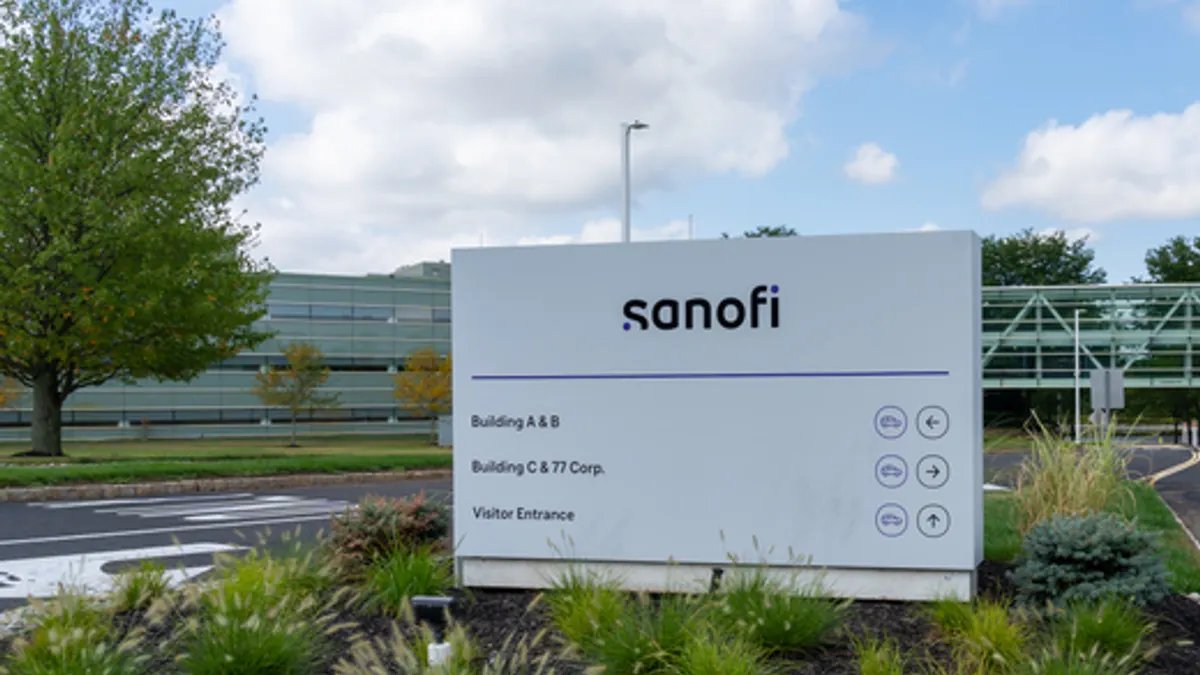Dive Brief:
- Sanofi and Regeneron plan to make a second attempt at expanding use of their blockbuster drug Dupixent to people with a chronic skin condition that causes hives.
- The Food and Drug Administration rejected the companies’ initial application in chronic spontaneous urticaria, or CSU, last year, requesting additional efficacy data to support the new use. On Wednesday, Sanofi and Regeneron said they now have the results they need to try again and said they plan to submit a new application to the FDA by the end of the year.
- The trial, known as LIBERTY-CUPID Study C, enrolled patients with CSU who had uncontrolled symptoms and were taking antihistamines. Patients who added Dupixent to their treatment regimen had almost a 50% reduction in itch and urticaria activity scores, compared with those who received a placebo, Sanofi and Regeneron said.
Dive Insight:
Dupixent is already one of the top-selling drugs in the world, with $11.6 billion in revenue last year. First approved in the U.S. in 2017 for eczema, the medicine is now prescribed for a wide variety of inflammatory conditions, including asthma. Sanofi and Regeneron also announced positive results in a blister-causing condition called bullous pemphigoid on Wednesday and said they will seek U.S. approval for that indication this year.
But Sanofi and Regeneron have encountered obstacles as they work to expand the market for Dupixent. The FDA delayed a decision on one of the biggest new potential indications for the drug — in chronic obstructive pulmonary disease — by three months over an extra data request. A decision is now expected by Sept. 27 on that application.
And on Wednesday, the companies said a small Phase 3 study of Dupixent in patients with severe chronic pruritus of unknown origin failed to reach statistical significance in its primary goal. Still, the companies said they saw promise in other endpoints and are planning a second pivotal study in the indication.
In CSU, Sanofi and Regeneron got mixed results in their initial Phase 3 program for Dupixent. Like the latest trial, a prior trial dubbed Study A succeeded in patients on antihistamines who had not been treated with the drug Xolair. Study B included patients who had previously taken Xolair, and that trial failed to reach statistical significance on its primary endpoint.
Sanofi and Regeneron said they will move quickly to share the results of Study C with the FDA and resubmit an application. They are vying to reach the U.S. market before competitors including Novartis, which in May announced plans to start seeking global approvals in CSU by the end of the year for its remibrutinib medicine.
Celldex Therapeutics, meanwhile, began two Phase 3 studies of its drug barzolvolimab in CSU patients in July after promising Phase 2 results released last year. And while different clinical studies can’t be compared directly, analysts at Cantor Fitzgerald said they view the Dupixent results as “underwhelming” in light of the data seen so far for Celldex.
Dupixent is now being used by 1 million patients across seven approved indications, according to Sanofi and Regeneron. Earlier this year, Japan became the first country to approve Dupixent for CSU, based on the Study A results.













